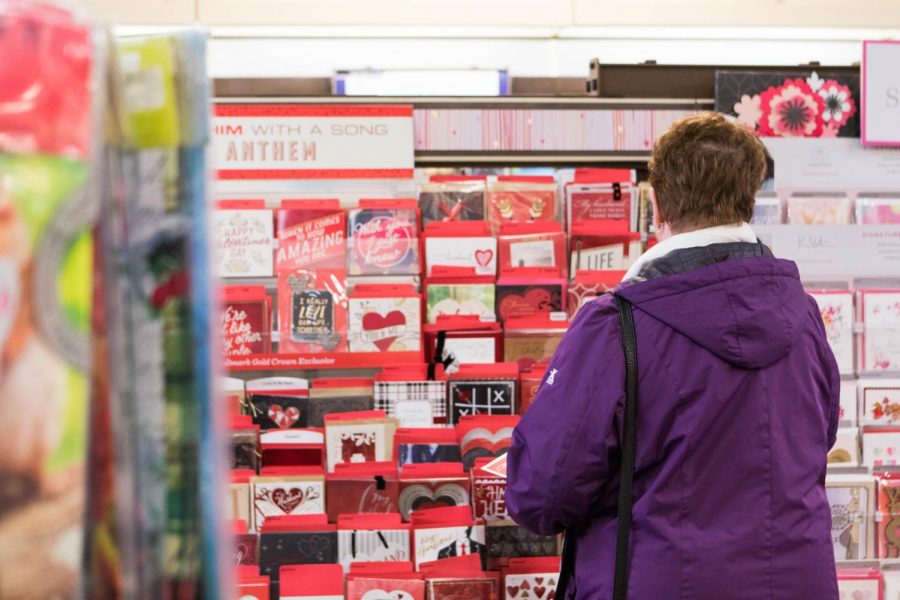Valentine’s Day reinforces gender stereotypes
Photo courtesy of Tribune News Service
A woman shops for Valentine’s Day cards at the Hallmark store at the Academy Plaza Shopping Center in Northeast Philadelphia on Feb. 2, 2018.
February 13, 2019
Valentine’s Day is upon us and for the past month, every store you walk into has one giant red section filled with heart-shaped chocolates and giant teddy bears. Every commercial break has advertisements from jewelry stores talking about how it’s the perfect time for a man to propose and stores like Victoria’s Secret advertise for Valentine’s Day lingerie to women.
The traditional way our culture celebrates Valentine’s Day reinforces gender norms and heteronormativity rather than representing all types of love and ways to celebrate love.
Think back to your years in elementary school where kids would give valentines to each other. Most cards for boys were blue with monster trucks on them, while cards for girls were pink with flowers on them. In my experience as a cisgender female, if I or my other girlfriends did not receive valentines from a boy, we questioned our self-worth.
These gender norms have been present since we were kids and they follow us throughout adulthood, specifically on Valentine’s Day.
Typically in our society, we see Valentine’s Day celebrated by a monogamous heterosexual couple, where it is the man’s duty to show love through a grand gesture like a proposal or buy the woman an expensive gift and a bouquet of flowers. If that is how a couple chooses to celebrate this day, then there is nothing wrong, but it becomes a problem when it’s the only thing represented.
Get The Daily Illini in your inbox!
With this, it is the man’s responsibility to show the woman affection through gifts. It is rarely portrayed where it is the day women must show love to their significant others because of the gender norm that women need more affection than men. Men also need emotional support and affection.
There is a stereotype that single women are unwanted, lonely, sad and are waiting for a man, and Valentine’s Day only heightens this. Bella DePaulo from Psychology Today writes, “…single life is supposed to be more of a problem for women than for men. Women are the ones who are believed to be yearning for marriage and crushed if they never do marry.” Statistics and surveys cited in the article show this stereotype is not true.
To show how gender norms and heteronormativity is reflected, a 2014 article from Mic has a list of sexist Valentine’s Day ads. One of them is a Super Bowl commercial with Adriana Lima where she states, “Give and you shall receive,” which insinuates the age-old expectation that if a man gives a woman a gift, she would owe him sex.
An article from Bustle lists reasons why Valentine’s Day is specifically difficult for people of the LGBT+ community. Valentine’s Day cards do not display same-sex couples or transgender couples. The article then explains how if you are customizing a gift, then you may have to explain your relationship if your partner uses a nontraditional gender pronoun, or “you’re simply someone who may be read as heterosexual or cisgender.” No one should have to explain their relationship.
I do think we have grown as a culture and we understand there are many different types of love that exists. In 2016, Hallmark released a Valentine’s Day ad that showcased same-sex couples and made “spectrum” cards that showed more diversity. Now, there are even “Galentine’s Day” parties where women celebrate female friendships and relationship independence.
Whether you want to celebrate this day through a more traditional route or something else entirely, it is up to you. However, be mindful of how this holiday still pushes unnecessary gender norms and ostracizes different identities. Above all else, Valentine’s Day is about love and not hatred for others.
Jaime is a junior in LAS.







